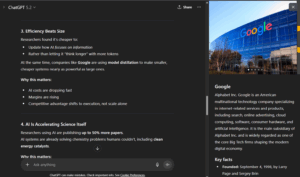
Creating a website is something that is increasingly important for those that want to get their business name, organizational goals, or personal thoughts out into the public domain. It is a method of sharing with a large audience and representing a cause quickly and efficiently. Whether it is a photography page, personal blog, or business website, the numbers of topics and genres of interests covered online is virtually endless. There is, in essence, a potential page for everyone and everything.
With that said, there is an inherent level of competition in creating a webpage. Ultimately, the goal is to spread information on a particular topic or about a certain thing when a page is created. But, there are millions of webpages available for public consumption, each fighting for viewer attention and web traffic. And new ones are being created daily. When it comes to building a page, then, it should not be looked at as a one-time production. Rather, it should be viewed as a fluid and evolving process that requires nurturing love and care. It needs maintenance and it needs evaluation in order to achieve its end goals and continue to garner an impact.
There are many reasons why a website should not remain stagnant, which will be discussed in detail further on in this article. But, the most generalized and easiest way to explain the need for consistent review is summarized by saying that a page that is not reviewed is easily lost in the fray. One of the ways that a page can compete in a global market is through website optimization. This complicated term can seem confusing to those that are not in the website developing or building industry. Therefore, the following discusses the importance of this service as well as why it is necessary. First, though, as any good dialogue in understanding begins, this article describes just what website optimization is in relation to a functional or new page.
What Is Website Optimization?
At its basis, website optimization is about building a page that is relevant to today’s market and internet world. That is to say, that an optimized website is one that speaks to the current internet world and stands out among its competitors. Ultimately, webpages want to garner traffic. They want visitors to come and read the content that is provided, or in some cases, purchase a service or product. When a genre or topic is covered via multiple pages, though, there is an inherent competition between these pages for said traffic. Therefore, it becomes important for a page to be optimized at a level that increases their potential traffic at a greater rate.
The Features of Website Optimization
There are many different steps and services that come along with website optimization. It should not be seen, then, as one task. Rather, it should be seen as several different tasks and services that combine to optimize a page to the highest level. Among the most popular of website optimization include the following.
1. Search Engine Optimization
Search Engine Optimization (SEO) is a very popular topic in today’s internet world. SEO refers to a page’s ability to optimize or advance its content so that higher search engine rankings are derived when a webs user looks for that particular type of page. That is to say that SEO done right provides a page with a higher listing on a “returned results page” from a typical web search.
The reason that this is so important to achieve is because of user behavior. A typical web user is over fifty percent more likely than not to select a link that is higher up in the rankings than lower or even on a different results page. Therefore, an individual page has a greater chance of garnering traffic it finds itself at a higher place in this list. To rank lower is to lose a pretty awesome opportunity for a customer to visit.
But, simply wanting to be higher and actually achieving it are two very different things. That is why search engine optimization experts are a valuable asset to have. SEO is calculated through a complex set of algorithms on the backend of the search engine’s reach. A successful webpage needs to know and understand the parts of this algorithm in order to achieve a higher result. For instance, one of the ways in which a search engine spits out its results to a consumer is via keyword searches. That is to say that a page gets a higher ranking if it utilizes the terms in the search or common searches.
While the number of mentions can garner a higher result, simply placing keywords is not the answer. The algorithm also takes into account the quality of the content in which these words are placed. This is to help avoid a subpar page from getting a higher listing based only on the number of times it uses a word or phrase. The content is reviewed for the value it brings as well.
Search engine optimization is also accomplished when the content is updated. Old or unchanged content is likely to get a lower result in returned items that that which has never been updated. This is because the search engine page wants to provide the user with the best results to cover their topic. Old or unchanged information is likely to be outdated and may not provide a great response from the user.
2. Competitive Analysis
Beyond just SEO content and the results on a search engine, a website is optimized when it is viewed not in a vacuum. Rather, it needs to be looked at in a competitive environment. What are the competitor’s or similar page’s doing? Where are they succeeding? Where are they failing? The success or failures of another page can greatly help guide the results of a returned results list as well.
This is important, too, because it provides a business page especially with an understanding of where they stand in the market. No, it does not evaluate a tangible extension of that business but it does review the website in terms of the virtual storefront. A successful page of a competitor is likely to steal the traffic that a page wants. Learning from their strengths can change the course of a business and can ultimate regain lost traffic or recruit new. This is the basis of business, be it a nonprofit enterprise or a large, multi-national company.
3. Speed Review
The saying goes “time is money” and when it comes to website optimization, it is a recruitment tool for traffic, too. A page that takes an extensive amount of time to load is likely to see an individual click away from it or lose interest before all of the content is provided to them. Large image files or a host of unnecessary applications that require extensive plugins for a simple return is likely to slow down the process. The result is a page that takes too long to load and ultimately, loses the interest of the user.
As such, it is vital that a page administrator or web developer, as well as an optimization team, looks at the overall loading time of the page. Not only should it look at the main page but all the links away from that page as well. A page that takes too long is going to lose potential traffic and, ultimately, business. Therefore, reviewing loading times versus content is a great tool for assessing how to optimize the page, too.
4. Caching Your Page
Caching is an important part of optimizing your page. It will store the data that you garner from your user and help you to analyze their activity on your site. By knowing the traffic, a page is putting itself into a position to know who to recruit in the future and what type of viewers are absorbing the information provided.
A page that has local caching is losing massive amounts of information. For example, it will not alert when a visitor returns or other behavioral cues. This can drive analytical data down and provides a great deal of missed opportunity from that business. Because past behavior is a great predictor of future behavior, it is vital that a page has this knowledge or attempts to catch it through efficient caching.
Why Care?
Though not an extensive list, the aforementioned explains the different aspects of website optimization. But, again, why should a page administrator care? A successful page—if functioning properly—garners some traffic and it may be that that seems enough. But, the internet is a fast paced world where things can change quickly. What is working today may not be working tomorrow. This can result in lost opportunity and lost viewership.
Therefore, not only is it important for an individual page to have website optimization once but they need to have it regularly. Regular reviews ensure that what is working today will work tomorrow and also allows for a page to alter courses if necessary. An evolving page is one that is not happy with mediocrity and wants to change with the time. Therefore, regular reviews are something that anyone with a page should care about.
The business value that comes from regular optimization activities is littered throughout this article. A business page—no matter what type—is in competition with other businesses. It needs to stay ahead of the competition as if it would in a tangible world. That is to say that it needs to stay how these pages rank in relation to the one they administrate because that is part of keeping an eye on the competition.
A business page, too, is in essence a billboard for that business. It is a tool for marketing and a tool that will build a solid customer base outside of those who may pass a storefront—if one is present. If a business is solely online, the value that comes from researching the optimization of the webpage is not just important, it is crucial. Every click that directs someone to another page is a lost opportunity and missed consumer. Therefore, a business page—no matter what type of business—cannot afford not to invest in website optimization. It also needs to remain aware on a regular basis. Just as business needs change, so, too, do webpage optimization needs. Therefore, regular review can keep the business updated and aware of its competition.
Where to Turn
Running a website is not easy and requires a high level of knowledge that goes beyond simply creating words or placing images. When it comes to administrating a page, there are many different aspects to consider. That is why so many are turning toward outside help and companies in achieving their end goals. A third party administrator or third party presence can look at a page through objective eyes and review what has changed, what needs changed, and how to optimize a page. It can also provide reporting that looks at the numbers and analytics with unemotional attachment.
Any company that specializes in website optimization should be well versed in several different areas, many of which were mentioned prior. They should have experience in SEO content and the overall needs in integration and graphic quality on a site. While website optimization companies do not necessarily need to do it all—if you do not want—they should be able to tell you how to improve.
Quality website optimization companies and teams are all around. There are several that focuses on providing quality reviews and help in keeping a page on the forefront of the industry. Not only that, but they can help to ensure that a page remains functional in a competitive market. These companies can range in price and will require a fee for their services. But, if you want your page to rise to the top of the pack—or have a chance to do that—then the investment is very much worth it.
About The Author
Khalid Essam
Khalid is the Chief of Staff at AOK. He collaborates with a team of specialists to develop and implement successful digital campaigns, ensuring strategic alignment and optimal results. With strong leadership skills and a passion for innovation, Khalid drives AOK’s success by staying ahead of industry trends and fostering strong client and team relationships.



